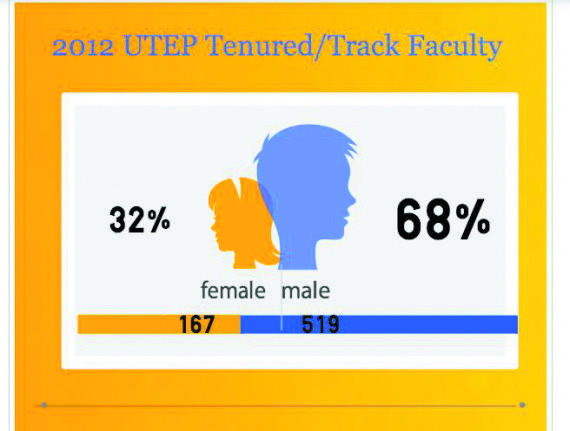National statistics and trends reveal that women have lower percentages of tenure track positions than men despite a higher number of women entering the doctoral fields.
The number of women receiving tenure counters trends of women receiveing degrees at the undergraduate, graduate and doctoral level.
According to the Bureau of Labor Statistics women are 60 percent more likely than men to earn a bachelor’s degree by the time they are 23. The U.S. Department’s National Center for Education Statistics reveals that women now earn 51 percent of all doctorates awarded to U.S. Citizens from American Intuitions. National statistics that are consistent with UTEP’s own figures.
Cheryl B. Torsney, UTEP senior vice provost said, “currently in the undergraduate level there are more women than men in the ranks
of students.”
According to UTEP’s 2012 fact book, 1,911 females received an undergraduate degree at UTEP versus 1,221 males. At the masters level, 591 females received a graduate degree in comparison to 543 men, while at the doctoral level 22 females received a degree in comparison to 44 men.
The amount of women pursuing higher education is expected to increase. The National Center for Education Statistics projects that enrollment of women in post-secondary degree granting institutions will increase 18 percent from 2010-2021 compared to 10 percent for men.
Despite figures showing a higher amount of women entering post-secondary education, data by the American Association of University Professors reveals that nationally only 38 percent of full time faculty professors are women and a low 23 percent of them are full professors.
The phenomenon, of women entering and completing doctoral programs but dropping out during tenure-track has lead researchers at the University of California, Berkeley to label it the leaking pipeline for women Ph.D’s.
“You have a lot of women going into the pipeline about the same rate as men but when you come out the other end…something happens to those women, the numbers are vastly different at the other end of the pipeline,” said Lee Anne Westman visiting professor at UTEP for Humanities and women’s studies.
Research by the University of California Berkeley finds that women drop off or are discouraged from pursuing the tenure track because of marriage and childbirth.
After receiving doctorates, married women with children under the age of 6 are 50 percent less likely than married men with
children under 6 to enter tenure-track positions.
A separate study done by Mason and Goulden using data from the doctoral recipients revealed that women who are married are 21 percent less likely than single women to enter a track position, and women with children younger than 6 are 28 percent less likely to enter a tenure track position than women without babies. “Year by year you’ll see that there’s female faculty that have left. They leave before even going through the tenure process. Most of the women have left before tenure because they know they won’t get it,” said clinical professor
Ivonne Santiago.
UTEP’s own fact book reveals that in 2012 there were 352 men with tenure compared to 167 women. However, UTEP had 401 non-tenured track faculty that were women compared
to 388 men.
The greatest disparity between tenured professors was seen in the engineering department where there were 73 men with tenure compared to nine women.
It’s not necessarily the difficulties of being a working mother that deter women from pursuing the tenure track, but the rigidity of an outdated system that is inflexible to working mothers.
“It’s the kind of system that favors people with no children, women are often in their 30s by the time they get tenure, which makes it more difficult to have kids,” Westman said.
According to Feminist legal scholar Joan Williams current models for tenure track are based on the career of white male academics that does not fit women with children and spouses.
Charlotte Ullman, associate professor of teacher education said, “most of the straight white men that I’ve talked to didn’t think twice about tenure they just assumed they would have it.”
Women who are married and have children and are also attempting to achieve tenure do not receive support from universities and sometimes receive discouragement from colleges and mentors.
“We don’t have policies that support women or families…my professors told me you will not finish if you keep having kids. You will not excel in your career and in fact my second pregnancy I hid. I didn’t tell anybody I was pregnant,” Westman said.
Research by University of California at Berkeley reveals that 70 percent of women and more than one-half of men considered faculty careers at research universities not friendly to family life.
“I can only speak for myself… but all I can say is that it’s not a friendly for environment for females and especially for Hispanic females …I took three years off to bond with my child and when I came back that was professional suicide. My 15 years of experience before that don’t count, what counts now is those three years that I was doing nothing,” Santiago said.
Current policies in place at UTEP that could be beneficial towards women who are married or with children and are pursuing tenure include the Family Medical and Leave Act which allows employees to take unpaid, job protected leave.
There is also the Women’s Advisory Council to the President whose aim is to serve as a direct communication channel between women faculty, staff, students and the president. They also run a daycare center on campus. “This is a pretty family friendly place, there are more children on campus than any other campus I have ever been on and it’s a warm and friendly environment,” Torsney said.
Maria Esquinca may be reached at [email protected].






